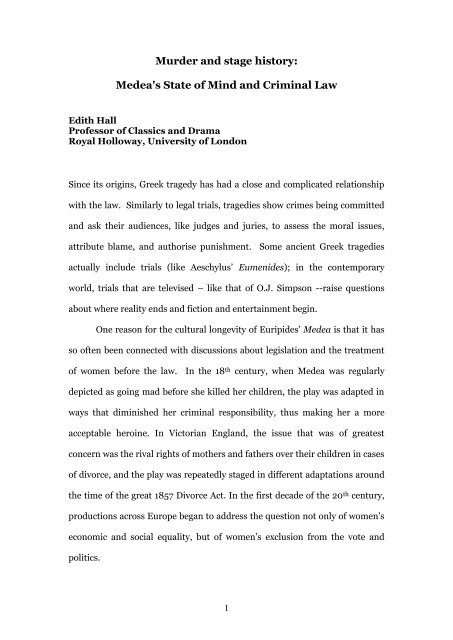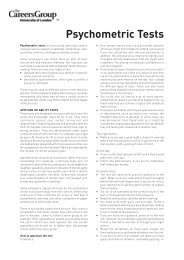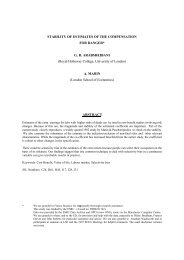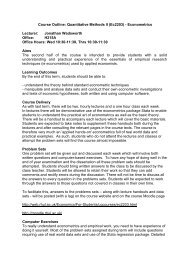Medea's State of Mind and Criminal Law - Royal Holloway ...
Medea's State of Mind and Criminal Law - Royal Holloway ...
Medea's State of Mind and Criminal Law - Royal Holloway ...
You also want an ePaper? Increase the reach of your titles
YUMPU automatically turns print PDFs into web optimized ePapers that Google loves.
Murder <strong>and</strong> stage history:<br />
<strong>Medea's</strong> <strong>State</strong> <strong>of</strong> <strong>Mind</strong> <strong>and</strong> <strong>Criminal</strong> <strong>Law</strong><br />
Edith Hall<br />
Pr<strong>of</strong>essor <strong>of</strong> Classics <strong>and</strong> Drama<br />
<strong>Royal</strong> <strong>Holloway</strong>, University <strong>of</strong> London<br />
Since its origins, Greek tragedy has had a close <strong>and</strong> complicated relationship<br />
with the law. Similarly to legal trials, tragedies show crimes being committed<br />
<strong>and</strong> ask their audiences, like judges <strong>and</strong> juries, to assess the moral issues,<br />
attribute blame, <strong>and</strong> authorise punishment. Some ancient Greek tragedies<br />
actually include trials (like Aeschylus‟ Eumenides); in the contemporary<br />
world, trials that are televised – like that <strong>of</strong> O.J. Simpson --raise questions<br />
about where reality ends <strong>and</strong> fiction <strong>and</strong> entertainment begin.<br />
One reason for the cultural longevity <strong>of</strong> Euripides' Medea is that it has<br />
so <strong>of</strong>ten been connected with discussions about legislation <strong>and</strong> the treatment<br />
<strong>of</strong> women before the law. In the 18 th century, when Medea was regularly<br />
depicted as going mad before she killed her children, the play was adapted in<br />
ways that diminished her criminal responsibility, thus making her a more<br />
acceptable heroine. In Victorian Engl<strong>and</strong>, the issue that was <strong>of</strong> greatest<br />
concern was the rival rights <strong>of</strong> mothers <strong>and</strong> fathers over their children in cases<br />
<strong>of</strong> divorce, <strong>and</strong> the play was repeatedly staged in different adaptations around<br />
the time <strong>of</strong> the great 1857 Divorce Act. In the first decade <strong>of</strong> the 20 th century,<br />
productions across Europe began to address the question not only <strong>of</strong> women‟s<br />
economic <strong>and</strong> social equality, but <strong>of</strong> women‟s exclusion from the vote <strong>and</strong><br />
politics.<br />
1
Repeatedly, specific women charged with maternal filicide have been<br />
scrutinised for the similarities their psychological pr<strong>of</strong>iles bear to that <strong>of</strong> the<br />
Euripidean Medea. Twentieth- <strong>and</strong> twenty-first century Medeas, meanwhile,<br />
have <strong>of</strong>ten been reconfigured as victims <strong>of</strong> patriarchal oppression, stung into<br />
action only after years <strong>of</strong> suffering at the h<strong>and</strong>s <strong>of</strong> men who have exploited<br />
their economic dependence in order to expose them to criminal abuse: Medea<br />
has even come to represent a symbol <strong>of</strong> resistance for women serving prison<br />
sentences for a many more (<strong>and</strong> much more trivial) crimes than she ever<br />
herself committed. In North America, a project encouraging women serving<br />
prison sentences to use drama to heal <strong>and</strong> grow personally has called itself the<br />
Medea project.<br />
Yet my discussion today centres on another aspect <strong>of</strong> the law. It argues<br />
that one <strong>of</strong> the reasons why Medea has proved so perennially fascinating is<br />
that it thinks about murder as a crime. In one sense, it does not matter who<br />
the people that are murdered are, nor whether the killer is male or female: the<br />
point is that this is the first play in the Western theatrical tradition in which<br />
the audience watches someone make up their mind to kill, in great detail, <strong>and</strong><br />
then carry out their decision. The play asks why people commit murder, <strong>and</strong><br />
how they have usually wrestled with terrible emotions like anger <strong>and</strong> jealousy.<br />
The issue is made more complicated because the play does acknowledge that<br />
Medea has been involved in a killing before – that <strong>of</strong> her own brother years<br />
ago in the Black Sea. This <strong>of</strong> course raises the question <strong>of</strong> whether previous<br />
<strong>of</strong>fences are relevant <strong>and</strong> can be used as evidence in a legal trial. But the play,<br />
in particular, tackles head-on the issue <strong>of</strong> criminal responsibility by<br />
questioning the distinctions between „unprovoked‟ murder <strong>and</strong> manslaughter<br />
2
under „provocation‟ -- what in the USA is called the distinction between<br />
„premeditated‟ first-degree murder <strong>and</strong> „unpremeditated‟ second-degree<br />
murder.<br />
Medea is the only surviving Greek tragedy where a murder is<br />
committed in this entirely ambiguous moral terrain. Clytemnestra's murder <strong>of</strong><br />
Agamemnon in Aeschylus‟ Agamemnon has been planned for many years,<br />
<strong>and</strong> is therefore absolutely premeditated. Heracles in Euripides‟ Heracles<br />
Furens <strong>and</strong> Agaue in his Bacchae kill their children while demonstrably<br />
deluded <strong>and</strong> insane. The nearest parallels to Medea are actually <strong>of</strong>fered by two<br />
other parents in Euripides. Creusa in Ion is persuaded into making an attempt<br />
on the life a youth she does not know is her son while she is sane but<br />
distraught. Agamemnon in Iphigenia in Aulis authorises the sacrifice <strong>of</strong> his<br />
daughter when clinically sane but psychologically confused <strong>and</strong> under<br />
pressure.<br />
In the history <strong>of</strong> adaptations, from ancient Greece to the third<br />
millennium, the ambiguity inherent in the original Medea <strong>of</strong> Euripides has<br />
prompted numerous responses to <strong>Medea's</strong> criminal culpability or lack <strong>of</strong> it. It<br />
has produced a wide variety <strong>of</strong> adaptations for performance, related to<br />
historical changes in the cultural <strong>and</strong> legal views <strong>of</strong> murder, provocation, <strong>and</strong><br />
premeditation. In the 19 th century the great Italian actress Adelaide Ristori<br />
refused to play the role <strong>of</strong> Medea unless the play was rewritten by Ernest<br />
Legouvé to make the child-killing an act motivated by altruism (that is, to save<br />
the boys from a worse <strong>and</strong> more painful death). When Diana Rigg took the<br />
role <strong>of</strong> Medea in 1993, directed by Jonathan Kent – a production that was a<br />
big box-<strong>of</strong>fice hit in both London <strong>and</strong> New York – she deliberately made her<br />
Medea as sane <strong>and</strong> intellectually considered as possible. Yet Fiona Shaw, a few<br />
3
years later, presented the murder <strong>of</strong> the children as taking place during a fit <strong>of</strong><br />
psychosis brought on by intolerable provocation. She seems to have been<br />
thinking she was bathing the children when she killed them. Every actress,<br />
every translator <strong>and</strong> every director has to make this fundamental choice.<br />
Most legislatures, including those <strong>of</strong> classical Athens <strong>and</strong> third-<br />
millennial North America, Britain <strong>and</strong> Germany, acknowledge that if violence<br />
has been a spontaneous response to unreasonable provocation, this can be a<br />
factor that mitigates an individual's culpability for a crime. It provocation can<br />
be proved, then it can cut prison sentences by many years. It can make murder<br />
(Mord) more like manslaughter with some real justification („<strong>Mind</strong>er schwerer<br />
Fall des Totschlags‟ according to article 213 <strong>of</strong> the German Strafgesetzbuch,<br />
which speaks <strong>of</strong> the killer being less culpable<br />
„durch eine ihm oder einem Angehörigen zugefügte Missh<strong>and</strong>lung oder<br />
schwerer Beleidigung von dem getöteten Menschen zum Zorn gereizt<br />
und hierdurch auf der Stelle zur Tat hingerissen worden…‟).<br />
Euripides' tragedy therefore raises questions not only about the gendering <strong>of</strong><br />
<strong>Medea's</strong> psyche <strong>and</strong> the degree to which as a woman she is capable <strong>of</strong> moral<br />
deliberation, but, crucially, about <strong>Medea's</strong> own stated view that she is acting,<br />
as an autonomous agent before the law, with full moral underst<strong>and</strong>ing,<br />
competence, <strong>and</strong> time to consider her actions.<br />
I believe that Euripides' presentation <strong>of</strong> what happened outside <strong>and</strong><br />
inside that resident alien's house in Corinth, during the course <strong>of</strong> a single day<br />
in the late Bronze Age, is deliberately <strong>and</strong> carefully crafted. This is done in<br />
order to raise questions about <strong>Medea's</strong> own stated view -- <strong>and</strong> that <strong>of</strong> many<br />
4
subsequent scholars, interpreters, translators, actresses <strong>and</strong> directors -- that<br />
she is acting freely, with freewill, out <strong>of</strong> choice informed by full moral<br />
underst<strong>and</strong>ing <strong>of</strong> her actions. It is interesting that several contemporary<br />
forensic psychologists have recently argued that when parents separate,<br />
children are acutely vulnerable to violence from the ab<strong>and</strong>oned party, but that<br />
in most cases this extremely volatile <strong>and</strong> dangerous period only lasts for about<br />
one week. Children are at terrible risk during the first week after their parents<br />
separate, even if those parents would never normally be violent at all. This is<br />
how explosive <strong>and</strong> strong the emotions are at this critical time. And by far the<br />
most important issue here is the speed at which the events in Euripides'<br />
Medea develop: the children‟s parents have indeed only just split up.<br />
<strong>Medea's</strong> state <strong>of</strong> psychological shock at being ab<strong>and</strong>oned may be a day<br />
or two old, but she is banished <strong>and</strong> then argues violently with her husb<strong>and</strong><br />
immediately before the murders she commits: they may indeed be<br />
„premeditated‟, but the „premeditation‟ is extremely compressed <strong>and</strong> abridged;<br />
alternatively, it could be argued that Euripides has stretched the precise<br />
definitions <strong>of</strong> 'sudden' violence in response to unbearable 'provocation' to<br />
their absolute limits. Euripides' Medea not only deconstructs the psychic<br />
categories <strong>of</strong> 'male' <strong>and</strong> 'female', but rivets attention on the blunt instruments<br />
that both ancient <strong>and</strong> modern criminal law needed (<strong>and</strong> today still need) to<br />
utilise.<br />
Provocation in <strong>Criminal</strong> <strong>Law</strong> is a ground <strong>of</strong> defence found in many legal<br />
systems. This defence attempts to excuse a crime by alleging a 'sudden' or<br />
'temporary' 'loss <strong>of</strong> control' (as opposed to a plea <strong>of</strong> insanity) in response to<br />
another's provocative conduct. In the UK <strong>and</strong> some other Common <strong>Law</strong><br />
jurisdictions it is only available against a charge <strong>of</strong> murder <strong>and</strong> only acts to<br />
5
educe the conviction to voluntary manslaughter. In the United <strong>State</strong>s <strong>of</strong><br />
America the absence <strong>of</strong> premeditation is one <strong>of</strong> the ways <strong>of</strong> distinguishing<br />
second-degree murder from first-degree murder. Yet in some states <strong>of</strong> the<br />
USA, premeditation has been seen as requiring only a few seconds'<br />
deliberation before the murderous act, while in others it can be seen as<br />
requiring several hours. How long has Medea got? In Engl<strong>and</strong>, the crucial<br />
terms are in Section 3 <strong>of</strong> the Homicide Act 1957:<br />
“Where on a charge <strong>of</strong> murder there is evidence on which the<br />
jury can find that the person charged was provoked (whether by things<br />
done or by things said or by both together) to lose his self-control, the<br />
question whether the provocation was enough to make a<br />
reasonable man do as he did shall be left to be determined by the<br />
jury; <strong>and</strong> in determining that question the jury shall take into account<br />
everything both done <strong>and</strong> said according to the effect which, in their<br />
opinion, it would have on a reasonable man.”<br />
The 1957 act changed the common law in Britain which had previously<br />
provided that provocation must be more than words alone <strong>and</strong> had to be form<br />
<strong>of</strong> violence by the victim to the accused, subject only to two exceptions - a<br />
husb<strong>and</strong> discovering his wife in the act <strong>of</strong> adultery; <strong>and</strong> a father discovering<br />
someone committing sodomy on his son! Instead, the new Act provided that<br />
provocation can be by anything done or said without it having to be an illegal<br />
act; the provoker <strong>and</strong> the deceased can be third parties. If the accused was<br />
provoked, who provoked him is irrelevant.<br />
6
My view that Euripides is making us all scrutinise the difficulty <strong>of</strong><br />
distinguishing between provoked <strong>and</strong> unprovoked murder is supported by the<br />
fact that this distinction was acknowledged in the legal system <strong>of</strong> his own day,<br />
in Classical Athens <strong>of</strong> the fifth century BC. There has survived a speech by the<br />
Athenian lawyer Lysias, called Against Eratosthenes. This is the actual<br />
defence speech <strong>of</strong> a man on trial certainly within a few decades <strong>of</strong> the<br />
première <strong>of</strong> Euripides' Medea. He freely admits that he has killed a man<br />
named Eratosthenes, but is asking to be acquitted because Athenian law<br />
allowed a man to kill another whom he found in bed with his wife. No<br />
entrapment was allowed <strong>and</strong> the occasion had to arise spontaneously. But the<br />
killer did not have to prove that he had only just discovered that the affair was<br />
going on. The man on trial says that his slave girl had told him about the<br />
affair, <strong>and</strong> he had gone home, with witnesses, to find the man st<strong>and</strong>ing naked<br />
on his own marriage bed beside his wife. It was at this sight that he became<br />
angry <strong>and</strong> struck the lover. The implication is that killing a man found in this<br />
sexual situation with your wife was perfectly underst<strong>and</strong>able!<br />
Yet even to raise the question <strong>of</strong> diminished responsibility in the case <strong>of</strong><br />
Euripides' Medea may seem fundamentally misguided. At the point that she<br />
finally makes up her mind to commit child-murder, she notoriously states that<br />
although she is well aware that what she is going to do is wrong, her internal<br />
organ <strong>of</strong> passionate emotion, what the Greeks called her thumos, has<br />
overwhelmed the conclusions to which her deliberations have (or would) lead<br />
her -- that is, her emotion has overwhelmed her reason (1079-80). These two<br />
iambic lines, favourites <strong>of</strong> ancient philosophers, thus explicitly frame her as<br />
the protagonist in the earliest known version <strong>of</strong> any Greek myth to make a<br />
mother kill her own children knowingly: this was almost certainly Euripides'<br />
7
own innovation in 431 BC, <strong>and</strong> it was a shocking departure from the ancient<br />
convention by which filicidal parents were exonerated (up to a point) by a fit<br />
<strong>of</strong> madness at the time <strong>of</strong> the commission <strong>of</strong> the crime: examples <strong>of</strong> course<br />
include Heracles in Euripides' Heracles Furens <strong>and</strong> Agave in his Bacchae.<br />
Does the play, however, imply that Medea has really been able to think<br />
clearly about what she is doing? At the beginning <strong>of</strong> the play we hear that<br />
Jason <strong>and</strong> Medea arrived in Corinth as man <strong>and</strong> wife some time ago. Medea is<br />
described by the nurse as someone 'who has won a warm welcome from her<br />
new fellow citizens <strong>and</strong> seeks to please her husb<strong>and</strong> in all she does' (11-13).<br />
But at the moment when the play opens, Jason has, it seems just a day or two<br />
ago, ab<strong>and</strong>oned Medea to marry instead the Corinthian princess, daughter <strong>of</strong><br />
Creon. The exact timing <strong>of</strong> the wedding rituals is left very ambiguous, partly<br />
because there was no one exact minute in ancient Athenian law when a couple<br />
became completely married legally, at least until the birth <strong>of</strong> the first child<br />
acknowledged as his by the father.<br />
Medea has been lying prostrate <strong>and</strong> unfed ever since heard the news<br />
that she had been 'just lately' ab<strong>and</strong>oned by her husb<strong>and</strong> (25-26), for a period<br />
<strong>of</strong> time which can't be understood as more than hours or a few days at the very<br />
most. Although her nurse is terrified <strong>of</strong> what she may do, <strong>and</strong> feels fear <strong>of</strong> a<br />
general kind on behalf <strong>of</strong> the children (45-6), until after the Aegeus scene (i.e.<br />
until more than half-way through the play) there is only one suggestion that<br />
they are in serious danger. This suggestion is <strong>Medea's</strong> own inclusive curse on<br />
her whole family -- comprising the children, herself as the 'wretched mother',<br />
the father <strong>and</strong> the whole household (113-14). The occurrence that actually<br />
precipitates her into action <strong>of</strong> any kind is Creon's arrival to announce her<br />
banishment, with immediate effect: all the rest <strong>of</strong> the events <strong>of</strong> the play then<br />
8
accelerate over a matter <strong>of</strong> the few hours' grace she succeeds in extracting<br />
from him. The exile decree is certainly a measure which has only just been<br />
taken, since it is to announce Creon's decision that the tutor arrives (67-72). It<br />
is the immediate impact on Medea <strong>of</strong> this fresh blow that the play dramatises.<br />
Medea commits all the murders during the same day that she receives this<br />
news. She has less than 24 hours to find a solution. It could be argued by a<br />
barrister that this is really unbearable psychological pressure.<br />
The banishment – decree <strong>of</strong> permanent exile from Corinth -- tends to<br />
get overlooked by modern interpreters <strong>of</strong> the ancient play. For in the ancient<br />
Greek world, to be without a city, or friends in any other city, especially for a<br />
woman, was a virtual death sentence. The degree <strong>of</strong> panic which it induces in<br />
Medea is palpable: it is revealed, just after Creon leaves, in her improbable<br />
fantasies about the different ways she could try to steal into the palace <strong>and</strong> kill<br />
Jason <strong>and</strong> his bride (376-80). The big mistake Creon makes is to allow a<br />
woman in this volatile state <strong>of</strong> mind alone to organise anything at all.<br />
The blows then rain hard on <strong>Medea's</strong> head. Jason arrives, but instead<br />
<strong>of</strong> helping her, he goads her <strong>and</strong> insults her during the course <strong>of</strong> some <strong>of</strong> the<br />
most unpleasant <strong>and</strong> insensitive speeches in world theatre. He even claims<br />
that he has left her for another woman for her own good! He also provokes her<br />
by talking about sex <strong>and</strong> about her different ethnicity. Yet the idea to kill the<br />
children is still not explicitly formulated in Medea‟s mind until after the<br />
Aegeus scene, the purpose <strong>of</strong> which is less to provide Medea with an ally than<br />
to make her aware just how much psychological pain can be caused to a man<br />
by childlessness. It is Aegeus' misery which prompts Medea into conceiving<br />
her plan to make Jason survive, but suffer. The decision remains far from<br />
final, however, <strong>and</strong> the psychological point <strong>of</strong> the 'vacillation' speech, during<br />
9
which Medea appears to change her mind no fewer than five times, is to<br />
portray that very struggle between <strong>Medea's</strong> heart <strong>and</strong> her mind -- her passion<br />
<strong>and</strong> her ability to make reasoned decisions -- that she finally admits has been<br />
won by the former.<br />
Let us look in more detail at Medea‟s great disturbed speech, which<br />
may have been extended <strong>and</strong> developed by actors trying to make sense <strong>of</strong><br />
Euripides‟ text even as early as the 5 th century BC. She says, over the course <strong>of</strong><br />
the whole long soliloquy<br />
• How sad that I must kill the children, but I must.<br />
• No, I can't do it; I will take them away with me.<br />
• Yes, I must do it in order to punish my enemies.<br />
• No, I can't do it, because they bring me joy.<br />
• The princess must be near death <strong>and</strong> I will despatch them<br />
shortly.<br />
• 'I underst<strong>and</strong> that what I am about to do is wrong, but my<br />
emotion (thumos) has vanquished my ability to deliberate<br />
(bouleumata)'<br />
But she still does not follow the boys inside to do it! She waits through 35 lines<br />
<strong>of</strong> tense anapaests while the chorus march, reciting gloomily, around the<br />
stage. Euripides is showing us a woman who is struggling morally. She is in<br />
crisis.<br />
When the messenger arrives, he recommends that she escape by any<br />
means possible, <strong>and</strong> concludes by saying that her dire punishment is<br />
unavoidable. <strong>Medea's</strong> first words after the messenger speech are 'My friends, I<br />
10
have decided to act at once. I will kill the children <strong>and</strong> then leave this l<strong>and</strong>‟<br />
(1236-7). She is not shown wavering again.<br />
If Medea were a classical Athenian male, who could prove that she had<br />
murdered her spouse's lover at the moment their affair was discovered, then<br />
she would have been acquitted at least <strong>of</strong> that crime. And Medea, <strong>of</strong> course,<br />
for much <strong>of</strong> the time thinks <strong>of</strong> herself in very masculine terms, using the<br />
language -- including the term thumos -- appropriate to Homeric warriors<br />
such as Achilles. She is very clear that she is an important person who has<br />
been insulted <strong>and</strong> publicly humiliated. That is the emotional background to<br />
the plot. And <strong>Medea's</strong> state <strong>of</strong> psychological shock at being ab<strong>and</strong>oned may be<br />
a day or two old, but she is banished <strong>and</strong> then argues violently with her<br />
husb<strong>and</strong> immediately before the murders she commits: they may indeed be<br />
„premeditated‟, but the „premeditation‟ is extremely compressed <strong>and</strong> abridged;<br />
alternatively, it could be argued that Euripides has stretched the precise<br />
definitions <strong>of</strong> 'sudden' violence in response to unbearable 'provocation' to<br />
their absolute limits. He is working on exactly the legal <strong>and</strong> psychological<br />
borderlines that judges <strong>and</strong> juries have to work on all the time, even in our<br />
own day.<br />
Yet the law has never been gender-blind, <strong>and</strong> contemporary feminist<br />
lawyers have been arguing that the range <strong>of</strong> defences available in the case <strong>of</strong><br />
murder are hopelessly sexist, since they are defined with a male defendant in<br />
mind: the mitigation <strong>of</strong> a murder charge on the ground <strong>of</strong> sudden anger was<br />
framed as, <strong>and</strong> is very much seen as, a 'male' defence suited to deaths<br />
consequent upon pub brawls <strong>and</strong> similar situations. Women who kill tend to<br />
do so after more extended periods <strong>of</strong> cumulative provocation or psychological<br />
11
hardship, <strong>and</strong> in less obviously explosive circumstances. In Britain, women<br />
have been convicted <strong>of</strong> murder, rather than the manslaughter that brings with<br />
it a much lighter sentence <strong>of</strong> many fewer years, after they have been<br />
systematically tortured <strong>and</strong> abused for long periods. The sexism inherent<br />
within ancient Greek psychology <strong>and</strong> law is also relevant, although from a<br />
different viewpoint, to the case <strong>of</strong> Euripides' Medea. Her status as a<br />
responsible <strong>and</strong> morally autonomous legal agent, since she is female, is<br />
fundamentally ambiguous, even anomalous.<br />
The ability to deliberate (in Greek, bouleuesthai) about ethical<br />
decisions was one which, according to Aristotle, using the same linguistic stem<br />
as Medea had a hundred years earlier (bouleu-), was in women inoperative, or<br />
'lacking governance' (a-kyron, Politics 1.1260a). The word for 'lacking<br />
governance' is a connected with the same root, kyr-, as the word which in<br />
Athenian society designated the male legal „guardian‟ <strong>and</strong> representative --<br />
father, brother, husb<strong>and</strong>, or uncle -- whom every woman was required to have<br />
<strong>and</strong> to obey throughout her life (her kyrios). This means that the 'governance'<br />
which Aristotle held was denied to the female's deliberative capacity was, in<br />
fact, the equivalent <strong>of</strong> male legal authority over the female. That is, according<br />
to ancient Greek men, female brains, especially the parts <strong>of</strong> them that take<br />
ethical decisions, can only operate safely under male supervision. Women<br />
need constant moral supervision. Jason <strong>and</strong> Creon were stupid to leave Medea<br />
unsupervised.<br />
Since Medea has been ab<strong>and</strong>oned without a husb<strong>and</strong>, brother or father<br />
to supervise <strong>and</strong> control her, Jason has created a situation in which there is a<br />
much greater likelihood that she will act unreasonably. Indeed, almost all<br />
Greek tragedy can be interpreted as illustrating Aristotle's view <strong>of</strong> the female<br />
12
deliberative faculty, since every tragic woman who becomes transgressive is<br />
either temporarily or permanently husb<strong>and</strong>less, <strong>and</strong> always lacks the presence<br />
<strong>and</strong> authority <strong>of</strong> a sanctioned kyrios. Phaedra falls in love when her husb<strong>and</strong><br />
goes away, Clytemnestra takes a lover <strong>and</strong> plots Agamemnon‟s death when he<br />
goes to Troy. The virgins Electra <strong>and</strong> Antigone are left without fathers <strong>and</strong><br />
brothers in the house when they begin to rebel against male authority. One<br />
other factor needs to be taken into account here. Ancient Greek medicine <strong>and</strong><br />
medical writers such as Hippocrates actually thought that women <strong>of</strong><br />
childbearing age who had no husb<strong>and</strong>s or regular sex life were actually prone<br />
to madness because their wombs w<strong>and</strong>ered around their body <strong>and</strong> damaged<br />
their mental ability <strong>and</strong> emotional self-control!<br />
Euripides' Medea, in conclusion, not only deconstructs the psychic<br />
categories <strong>of</strong> 'male' <strong>and</strong> 'female', but also raises questions about the precise<br />
definitions <strong>of</strong> moral responsibility, provocation <strong>and</strong> premeditation which the<br />
blunt instruments <strong>of</strong> both ancient <strong>and</strong> modern criminal law need to utilise.<br />
This very resistance to clear-cut psychological <strong>and</strong> legal categorisation has<br />
always helped to keep Medea on our minds, <strong>and</strong> looks set to be a major factor<br />
in the continued revival <strong>of</strong> her play <strong>and</strong> renewal <strong>of</strong> interest in her during the<br />
third millennium.<br />
13

















